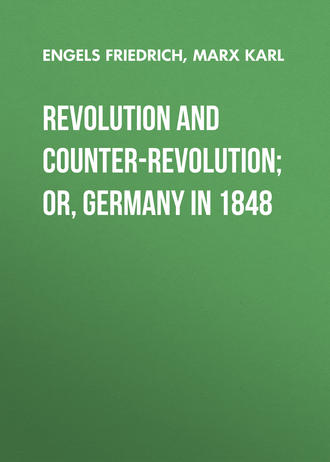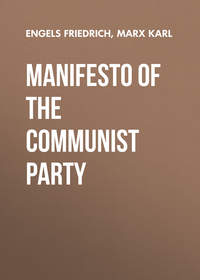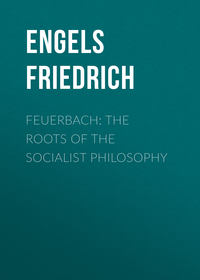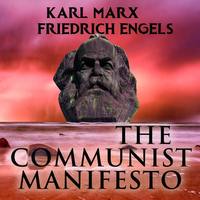 полная версия
полная версияRevolution and Counter-Revolution; Or, Germany in 1848
In 1844, there occurred the Silesian weavers' riots, followed by the insurrection of the calico printers of Prague. These riots, cruelly suppressed, riots of working men not against the Government, but against their employers, created a deep sensation, and gave a new stimulus to Socialist and Communist propaganda amongst the working people. So did the bread riots during the year of famine, 1847. In short, in the same manner as Constitutional Opposition rallied around its banner the great bulk of the propertied classes (with the exception of the large feudal land-holders), so the working classes of the larger towns looked for their emancipation to the Socialist and Communist doctrines, although, under the then existing Press laws, they could be made to know only very little about them. They could not be expected to have any very definite ideas as to what they wanted; they only knew that the programme of the Constitutional bourgeoisie did not contain all they wanted, and that their wants were no wise contained in the Constitutional circle of ideas.
There was then no separate Republican party in Germany. People were either Constitutional Monarchists, or more or less clearly defined Socialists or Communists.
With such elements the slightest collision must have brought about a great revolution. While the higher nobility and the older civil and military officers were the only safe supports of the existing system; while the lower nobility, the trading middle classes, the universities, the school-masters of every degree, and even part of the lower ranks of the bureaucracy and military officers were all leagued against the Government; while behind these there stood the dissatisfied masses of the peasantry, and of the proletarians of the large towns, supporting, for the time being, the Liberal Opposition, but already muttering strange words about taking things into their own hands; while the bourgeoisie was ready to hurl down the Government, and the proletarians were preparing to hurl down the bourgeoisie in its turn; this Government went on obstinately in a course which must bring about a collision. Germany was, in the beginning of 1848, on the eve of a revolution, and this revolution was sure to come, even had the French Revolution of February not hastened it.
What the effects of this Parisian Revolution were upon Germany we shall see in our next.
London, September, 1851.
III.
THE OTHER GERMAN STATES
November 6th, 1851.In our last we confined ourselves almost exclusively to that State which, during the years 1840 to 1848, was by far the most important in the German movement, namely, to Prussia. It is, however, time to pass a rapid glance over the other States of Germany during the same period.
As to the petty States, they had, ever since the revolutionary movements of 1830, completely passed under the dictatorship of the Diet, that is of Austria and Prussia. The several Constitutions, established as much as a means of defence against the dictates of the larger States, as to insure popularity to their princely authors, and unity to heterogeneous Assemblies of Provinces, formed by the Congress of Vienna, without any leading principle whatever – these Constitutions, illusory as they were, had yet proved dangerous to the authority of the petty princes themselves during the exciting times of 1830 and 1831. They were all but destroyed; whatever of them was allowed to remain was less than a shadow, and it required the loquacious self-complacency of a Welcker, a Rotteck, a Dahlmann, to imagine that any results could possibly flow from the humble opposition, mingled with degrading flattery, which they were allowed to show off in the impotent Chambers of these petty States.
The more energetic portion of the middle class in these smaller States, very soon after 1840, abandoned all the hopes they had formerly based upon the development of Parliamentary government in these dependencies of Austria and Prussia. No sooner had the Prussian bourgeoisie and the classes allied to it shown a serious resolution to struggle for Parliamentary government in Prussia, than they were allowed to take the lead of the Constitutional movement over all non-Austrian Germany. It is a fact which now will not any longer be contested, that the nucleus of those Constitutionalists of Central Germany, who afterwards seceded from the Frankfort National Assembly, and who, from the place of their separate meetings, were called the Gotha party, long before 1848 contemplated a plan which, with little modification, they in 1849 proposed to the representatives of all Germany. They intended a complete exclusion of Austria from the German Confederation, the establishment of a new Confederation, with a new fundamental law, and with a Federal Parliament, of the more insignificant States into the larger ones. All this was to be carried out the moment Prussia entered into the ranks of Constitutional Monarchy, established the Liberty of the Press, assumed a policy independent from that of Russia and Austria, and thus enabled the Constitutionalists of the lesser States to obtain a real control over their respective Governments. The inventor of this scheme was Professor Gervinus, of Heidelberg (Baden). Thus the emancipation of the Prussian bourgeoisie was to be the signal for that of the middle classes of Germany generally, and for an alliance, offensive and defensive of both against Russia and Austria, for Austria was, as we shall see presently, considered as an entirely barbarian country, of which very little was known, and that little not to the credit of its population; Austria, therefore, was not considered as an essential part of Germany.
As to the other classes of society, in the smaller States they followed, more or less rapidly, in the wake of their equals in Prussia. The shopkeeping class got more and more dissatisfied with their respective Governments, with the increase of taxation, with the curtailments of those political sham-privileges of which they used to boast when comparing themselves to the "slaves of despotism" in Austria and Prussia; but as yet they had nothing definite in their opposition which might stamp them as an independent party, distinct from the Constitutionalism of the higher bourgeoisie. The dissatisfaction among the peasantry was equally growing, but it is well known that this section of the people, in quiet and peaceful times, will never assert its interests and assume its position as an independent class, except in countries where universal suffrage is established. The working classes in the trades and manufactures of the towns commenced to be infected with the "poison" of Socialism and Communism, but there being few towns of any importance out of Prussia, and still fewer manufacturing districts, the movement of this class, owing to the want of centres of action and propaganda, was extremely slow in the smaller States.
Both in Prussia and in the smaller States the difficulty of giving vent to political opposition created a sort of religious opposition in the parallel movements of German Catholicism and Free Congregationalism. History affords us numerous examples where, in countries which enjoy the blessings of a State Church, and where political discussion is fettered, the profane and dangerous opposition against the worldly power is hid under the more sanctified and apparently more disinterested struggle against spiritual despotism. Many a Government that will not allow of any of its acts being discussed, will hesitate before it creates martyrs and excites the religious fanaticism of the masses. Thus in Germany, in 1845, in every State, either the Roman Catholic or the Protestant religion, or both, were considered part and parcel of the law of the land. In every State, too, the clergy of either of those denominations, or of both, formed an essential part of the bureaucratic establishment of the Government. To attack Protestant or Catholic orthodoxy, to attack priestcraft, was then to make an underhand attack upon the Government itself. As to the German Catholics, their very existence was an attack upon the Catholic Governments of Germany, particularly Austria and Bavaria; and as such it was taken by those Governments. The Free Congregationalists, Protestant Dissenters, somewhat resembling the English and American Unitarians, openly professed their opposition to the clerical and rigidly orthodox tendency of the King of Prussia and his favourite Minister for the Educational and Clerical Department, Mr. Eickhorn. The two new sects, rapidly extending for a moment, the first in Catholic, the second in Protestant countries, had no other distinction but their different origin; as to their tenets, they perfectly agreed upon this most important point – that all definite dogmas were nugatory. This want of any definition was their very essence; they pretended to build that great temple under the roof of which all Germans might unite; they thus represented, in a religious form, another political idea of the day – that of German unity, and yet they could never agree among themselves.
The idea of German unity, which the above-mentioned sects sought to realize, at least, upon religious ground, by inventing a common religion for all Germans, manufactured expressly for their use, habits, and taste – this idea was, indeed, very widely spread, particularly in the smaller States. Ever since the dissolution of the German Empire by Napoleon, the cry for a union of all the disjecta membra of the German body had been the most general expression of discontent with the established order of things, and most so in the smaller States, where costliness of a court, an administration, an army, in short, the dead weight of taxation, increased in a direct ratio with the smallness and impotency of the State. But what this German unity was to be when carried out was a question upon which parties disagreed. The bourgeoisie, which wanted no serious revolutionary convulsion, were satisfied with what we have seen they considered "practicable," namely a union of all Germany, exclusive of Austria, under the supremacy of a Constitutional Government of Prussia; and surely, without conjuring dangerous storms, nothing more could, at that time, be done. The shopkeeping class and the peasantry, as far as these latter troubled themselves about such things, never arrived at any definition of that German unity they so loudly clamoured after; a few dreamers, mostly feudalist reactionists, hoped for the re-establishment of the German Empire; some few ignorant, soi-disant Radicals, admiring Swiss institutions, of which they had not yet made that practical experience which afterwards most ludicrously undeceived them, pronounced for a Federated Republic; and it was only the most extreme party which, at that time, dared pronounce for a German Republic, one and indivisible. Thus, German unity was in itself a question big with disunion, discord, and, in the case of certain eventualities, even civil war.
To resume, then; this was the state of Prussia, and the smaller States of Germany, at the end of 1847. The middle class, feeling their power, and resolved not to endure much longer the fetters with which a feudal and bureaucratic despotism enchained their commercial transactions, their industrial productivity, their common action as a class; a portion of the landed nobility so far changed into producers of mere marketable commodities, as to have the same interests and to make common cause with the middle class; the smaller trading class, dissatisfied, grumbling at the taxes, at the impediments thrown in the way of their business, but without any definite plan for such reforms as should secure their position in the social and political body; the peasantry, oppressed here by feudal exactions, there by money-lenders, usurers, and lawyers; the working people of the towns infected with the general discontent, equally hating the Government and the large industrial capitalists, and catching the contagion of Socialist and Communist ideas; in short, a heterogeneous mass of opposition, springing from various interests, but more or less led on by the bourgeoisie, in the first ranks of which again marched the bourgeoisie of Prussia, and particularly of the Rhine Province. On the other hand, Governments disagreeing upon many points, distrustful of each other, and particularly of that of Prussia, upon which yet they had to rely for protection; in Prussia a Government forsaken by public opinion, forsaken by even a portion of the nobility, leaning upon an army and a bureaucracy which every day got more infected by the ideas, and subjected to the influence, of the oppositional bourgeoisie – a Government, besides all this, penniless in the most literal meaning of the word, and which could not procure a single cent to cover its increasing deficit, but by surrendering at discretion to the opposition of the bourgeoisie. Was there ever a more splendid position for the middle class of any country, while it struggled for power against the established Government?
London, September, 1851.
IV.
AUSTRIA
November 7th, 1851.We have now to consider Austria; that country which, up to March, 1848, was sealed up to the eyes of foreign nations almost as much as China before the late war with England.
As a matter of course, we can here take into consideration nothing but German Austria. The affairs of the Polish, Hungarian, or Italian Austrians do not belong to our subject, and as far as they, since 1848, have influenced the fate of the German Austrians, they will have to be taken into account hereafter.
The Government of Prince Metternich turned upon two hinges; firstly, to keep every one of the different nations subjected to the Austrian rule, in check, by all other nations similarly conditioned; secondly, and this always has been the fundamental principle of absolute monarchies, to rely for support upon two classes, the feudal landlords and the large stock-jobbing capitalists; and to balance, at the same time, the influence and power of either of these classes by that of the other, so as to leave full independence of action to the Government. The landed nobility, whose entire income consisted in feudal revenues of all sorts, could not but support a Government which proved their only protection against that down-trodden class of serfs upon whose spoils they lived; and whenever the less wealthy portion of them, as in Galicia, in 1846, rose in opposition against the Government, Metternich in an instant let loose upon them these very serfs, who at any rate profited by the occasion to wreak a terrible vengeance upon their more immediate oppressors. On the other hand, the large capitalists of the Exchange were chained to Metternich's Government by the vast share they had in the public funds of the country. Austria, restored to her full power in 1815 restoring and maintaining in Italy Absolute Monarchy ever since 1820, freed from part of her liabilities by the bankruptcy of 1810, had, after the peace, very soon re-established her credit in the great European money markets; and in proportion as her credit grew, she had drawn against it. Thus all the large European money-dealers had engaged considerable portions of their capital in the Austrian funds; they all of them were interested in upholding the credit of that country, and as Austrian public credit, in order to be upheld, ever required new loans, they were obliged from time to time to advance new capital in order to keep up the credit of the securities for that which they already had advanced. The long peace after 1815, and the apparent impossibility of a thousand years old empire, like Austria, being upset, increased the credit of Metternich's Government in a wonderful ratio, and made it even independent of the good will of the Vienna bankers and stock-jobbers; for as long as Metternich could obtain plenty of money at Frankfort and Amsterdam, he had, of course, the satisfaction of seeing the Austrian capitalists at his feet. They were, besides, in every other respect at his mercy; the large profits which bankers, stock-jobbers, and Government contractors always contrive to draw out of an absolute monarchy, were compensated for by the almost unlimited power which the Government possessed over their persons and fortunes; and not the smallest shadow of an opposition was, therefore, to be expected from this quarter. Thus Metternich was sure of the support of the two most powerful and influential classes of the empire, and he possessed besides an army and a bureaucracy, which for all purposes of absolutism could not be better constituted. The civil and military officers in the Austrian service form a race of their own; their fathers have been in the service of the Kaiser, and so will their sons be; they belong to none of the multifarious nationalities congregated under the wing of the double-headed eagle; they are, and ever have been, removed from one end of the empire to the other, from Poland to Italy, from Germany to Transylvania; Hungarian, Pole, German, Roumanian, Italian, Croat, every individual not stamped with "imperial and royal authority," etc., bearing a separate national character, is equally despised by them; they have no nationality, or rather, they alone make up the really Austrian nation. It is evident what a pliable, and at the same time powerful instrument, in the hands of an intelligent and energetic chief, such a civil and military hierarchy must be.
As to the other classes of the population, Metternich, in the true spirit of a statesman of the ancien régime, cared little for their support. He had, with regard to them, but one policy: to draw as much as possible out of them in the shape of taxation, and at the same time, to keep them quiet. The trading and manufacturing middle class was but of slow growth in Austria. The trade of the Danube was comparatively unimportant; the country possessed but one port, Trieste, and the trade of the port was very limited. As to the manufacturers, they enjoyed considerable protection, amounting even in most cases to the complete exclusion of all foreign competition; but this advantage had been granted to them principally with a view to increase their tax-paying capabilities, and was in a high degree counterpoised by internal restrictions on manufactures, privileges on guilds, and other feudal corporations, which were scrupulously upheld as long as they did not impede the purposes and views of the Government. The petty tradesmen were encased in the narrow bounds of these Mediæval guilds, which kept the different trades in a perpetual war of privilege against each other, and at the same time, by all but excluding individuals of the working class from the possibility of raising themselves in the social scale, gave a sort of hereditary stability to the members of those involuntary associations. Lastly, the peasant and the working man were treated as mere taxable matter, and the only care that was taken of them was to keep them as much as possible in the same conditions of life in which they then existed, and in which their fathers had existed before them. For this purpose every old, established, hereditary authority was upheld in the same manner as that of the State; the authority of the landlord over the petty tenant farmer, that of the manufacturer over the operative, of the small master over the journeyman and apprentice, of the father over the son, was everywhere rigidly maintained by the Government, and every branch of disobedience punished the same as a transgression of the law, by that universal instrument of Austrian justice – the stick.
Finally, to wind up into one comprehensive system all these attempts at creating an artificial stability, the intellectual food allowed to the nation was selected with the minutest caution, and dealt out as sparingly as possible. Education was everywhere in the hands of the Catholic priesthood, whose chiefs, in the same manner as the large feudal landowners, were deeply interested in the conservation of the existing system. The universities were organized in a manner which allowed them to produce nothing but special men, that might or might not obtain great proficiency in sundry particular branches of knowledge, but which, at all events, excluded that universal liberal education which other universities are expected to impart. There was absolutely no newspaper press, except in Hungary, and the Hungarian papers were prohibited in all other parts of the monarchy. As to general literature, its range had not widened for a century; it had narrowed again after the death of Joseph II. And all around the frontier, wherever the Austrian States touched upon a civilized country, a cordon of literary censors was established in connection with the cordon of customhouse officials, preventing any foreign book or newspaper from passing into Austria before its contents had been twice or three times thoroughly sifted, and found pure of even the slightest contamination of the malignant spirit of the age.
For about thirty years after 1815 this system worked with wonderful success. Austria remained almost unknown to Europe, and Europe was quite as little known in Austria. The social state of every class of the population, and of the population as a whole, appeared not to have undergone the slightest change. Whatever rancour there might exist from class to class – and the existence of this rancour was for Metternich a principal condition of government, which he even fostered by making the higher classes the instruments of all Government exactions, and thus throwing the odium upon them – whatever hatred the people might bear to the inferior officials of the State, there existed, upon the whole, little or no dissatisfaction with the Central Government. The Emperor was adored, and old Francis I. seemed to be borne out by facts when, doubting of the durability of this system, he complacently added: "And yet it will hold while I live, and Metternich."
But there was a slow underground movement going on which baffled all Metternich's efforts. The wealth and influence of the manufacturing and trading middle class increased. The introduction of machinery and steam-power in manufactures upset in Austria, as it had done everywhere else, the old relations and vital conditions of whole classes of society; it changed serfs into free men, small farmers into manufacturing operatives; it undermined the old feudal trades-corporations, and destroyed the means of existence of many of them. The new commercial and manufacturing population came everywhere into collision with the old feudal institutions. The middle classes, more and more induced by their business to travel abroad, introduced some mythical knowledge of the civilized countries situated beyond the Imperial line of customs; the introduction of railways finally accelerated both the industrial and intellectual movement. There was, too, a dangerous part in the Austrian State establishment, viz., the Hungarian feudal Constitution, with its parliamentary proceedings, and its struggles of the impoverished and oppositional mass of the nobility against the Government and its allies, the magnates. Presburg, the seat of the Diet, was at the very gates of Vienna. All the elements contributed to create among the middle classes of the towns a spirit, not exactly of opposition, for opposition was as yet impossible, but of discontent; a general wish for reforms, more of an administrative than of a constitutional nature. And in the same manner as in Prussia, a portion of the bureaucracy joined the bourgeoisie. Among this hereditary caste of officials the traditions of Joseph II. were not forgotten; the more educated functionaries of the Government, who themselves sometimes meddled with imaginary possible reforms, by far preferred the progressive and intellectual despotism of that Emperor to the "paternal" despotism of Metternich. A portion of the poorer nobility equally sided with the middle class, and as to the lower classes of the population, who always had found plenty of grounds to complain of their superiors, if not of the Government, they in most cases could not but adhere to the reformatory wishes of the bourgeoisie.
It was about this time, say 1843 or 1844, that a particular branch of literature, agreeable to this change, was established in Germany. A few Austrian writers, novelists, literary critics, bad poets, the whole of them of very indifferent ability, but gifted with that peculiar industrialism proper to the Jewish race, established themselves in Leipsic and other German towns out of Austria, and there, out of the reach of Metternich, published a number of books and pamphlets on Austrian affairs. They and their publishers made "a roaring trade" of it. All Germany was eager to become initiated into the secrets of the policy of European China; and the Austrians themselves, who obtained these publications by the wholesale smuggling carried on upon the Bohemian frontier, were still more curious. Of course, the secrets let out in these publications were of no great importance, and the reform plans schemed out by their well-wishing authors bore the stamp of an innocuousness almost amounting to political virginity. A Constitution and a free press for Austria were things considered unattainable; administrative reforms, extension of the rights of the Provincial Diets, admission of foreign books and newspapers, and a less severe censorship – the loyal and humble desires of these good Austrians did hardly go any farther.






